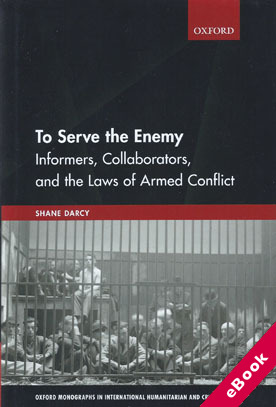
The device(s) you use to access the eBook content must be authorized with an Adobe ID before you download the product otherwise it will fail to register correctly.
For further information see https://www.wildy.com/ebook-formats
Once the order is confirmed an automated e-mail will be sent to you to allow you to download the eBook.
All eBooks are supplied firm sale and cannot be returned. If you believe there is a fault with your eBook then contact us on ebooks@wildy.com and we will help in resolving the issue. This does not affect your statutory rights.
A constant yet oftentimes concealed practice in war has been the use of informers and collaborators by parties to an armed conflict.
Despite the prevalence of such activity, and the serious and at times fatal consequences that befall those who collaborate with an enemy, international law applicable in times of armed conflict does not squarely address the phenomenon. The recruitment, use and treatment of informers and other collaborators is addressed only partially and at times indirectly by international humanitarian law.
In this book, Shane Darcy examines the development and application of the relevant rules and principles of the laws of armed conflict in relation to collaboration. With a primary focus on international humanitarian law as may be applicable to various forms of collaboration, the book also offers an assessment of the relevance of human rights and considers how the phenomenon of collaboration has been addressed post-conflict.